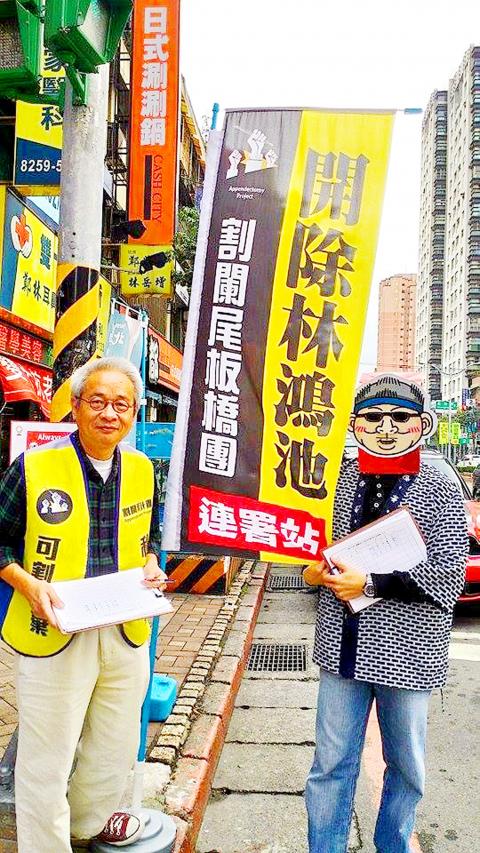With the petition to recall Chinese Nationalist Party (KMT) Legislator Alex Tsai (蔡正元) already submitted, activists from the Appendectomy Project have now turned their efforts to the two other campaigns to recall KMT legislators Wu Yu-sheng (吳育昇) and Lin Hong-chih (林鴻池).
With the deadline to submit the petitions on Friday, the project redoubled its efforts in the New Taipei City constituencies of Wu and Lin over the weekend.
In order to attain the required 13 percent threshold to launch a recall referendum, the project must garner the support of 37,469 signatories in Wu’s constituency of Tamsui/Sanjhi (淡水/三芝) districts, and 27,677 in Lin’s Banciao (板橋) constituency.

Photo: Courtesy of the Appendectomy Project
Project activists said more than 5,000 signatures were collected in Banciao on Saturday thanks to volunteers who canvassed several traditional marketplaces. However, the project has collected less than half of the required signatures to recall Lin.
It has had better luck with the petition to recall Wu, with nearly three-quarters of the required signatures gathered.
The petition to recall Tsai, which passed the required threshold last week, is now under review by the Central Election Commission, which has 40 days to verify the information provided by the petitioners. If it validates the petition, a recall referendum is likely to be held before the end of February.
The name Appendectomy Project was chosen because the term for pan-blue camp legislators in Mandarin Chinese, lan wei (藍委), is pronounced the same as the word for “appendix” (闌尾).
The project said it targeted the three KMT lawmakers because they adhered to President Ma Ying-jeou’s (馬英九) instructions rather than the public’s wishes.

The manufacture of the remaining 28 M1A2T Abrams tanks Taiwan purchased from the US has recently been completed, and they are expected to be delivered within the next one to two months, a source said yesterday. The Ministry of National Defense is arranging cargo ships to transport the tanks to Taiwan as soon as possible, said the source, who is familiar with the matter. The estimated arrival time ranges from late this month to early next month, the source said. The 28 Abrams tanks make up the third and final batch of a total of 108 tanks, valued at about NT$40.5 billion

Travel agencies in Taiwan are working to secure alternative flights for travelers bound for New Zealand for the Lunar New Year holiday, as Air New Zealand workers are set to strike next week. The airline said that it has confirmed that the planned industrial action by its international wide-body cabin crew would go ahead on Thursday and Friday next week. While the Auckland-based carrier pledged to take reasonable measures to mitigate the impact of the workers’ strike, an Air New Zealand flight arriving at Taipei from Auckland on Thursday and another flight departing from Taipei for Auckland on Saturday would have to

A group from the Taiwanese Designers in Australia association yesterday represented Taiwan at the Midsumma Pride March in Melbourne. The march, held in the St. Kilda suburb, is the city’s largest LGBTQIA+ parade and the flagship event of the annual Midsumma Festival. It attracted more than 45,000 spectators who supported the 400 groups and 10,000 marchers that participated this year, the association said. Taiwanese Designers said they organized a team to march for Taiwan this year, joining politicians, government agencies, professionals and community organizations in showing support for LGBTQIA+ people and diverse communities. As the first country in Asia to legalize same-sex

MOTIVES QUESTIONED The PLA considers Xi’s policies toward Taiwan to be driven by personal considerations rather than military assessment, the Epoch Times reports Chinese President Xi Jinping’s (習近平) latest purge of the Chinese People’s Liberation Army (PLA) leadership might have been prompted by the military’s opposition to plans of invading Taiwan, the Epoch Times said. The Chinese military opposes waging war against Taiwan by a large consensus, putting it at odds with Xi’s vision, the Falun Gong-affiliated daily said in a report on Thursday, citing anonymous sources with insight into the PLA’s inner workings. The opposition is not the opinion of a few generals, but a widely shared view among the PLA cadre, the Epoch Times cited them as saying. “Chinese forces know full well that